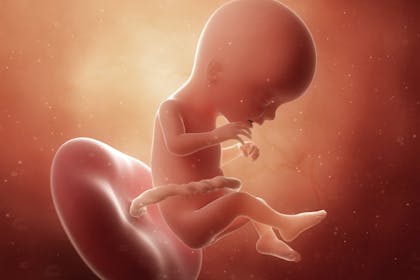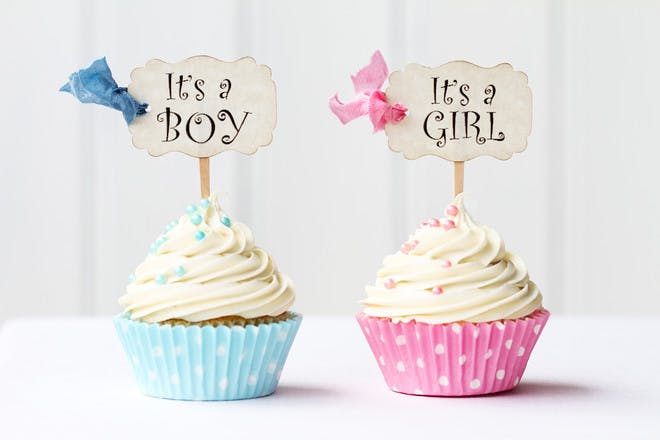From growth spurts to puffy ankles, find out what's going inside you – and out – now that you're 17 weeks pregnant and into your second trimester. Plus, why now's a good time to start thinking about childcare options for once you've had the baby.
This page contains affiliate links, which means we may earn a small amount of money if a reader clicks through and makes a purchase. All our articles and reviews are written independently by the Netmums editorial team.
What's happening at 17 weeks?
Here are the key things you can expect from your pregnancy at this stage:
- Your baby's had a growth spurt.
- You may feel aches and pains caused by pregnancy hormones.
- Puffy ankles may kick in.
- Thinking ahead: time to plan childcare!
How big is your baby?
Your baby is now around as long as a chocolate eclair. Your little one has been very busy growing in the last two weeks – now measuring around 13cm from crown to rump and the weight has doubled to 140g.
At the moment there’s hardly any fat under your baby's skin (if you were to see them now they'd look a bit wrinkly), but by the time of the birth it will make up two-thirds of their birth weight. A lot of your baby's development from now on will be simply gaining fat and growing bigger and bigger!
FREE NEWBORN NAPPIES
The placenta is growing too – by the time you give birth, the placenta and amniotic fluid together will weigh almost half as much as your baby!
Your baby continues to use the amniotic sac as a playground – tossing, turning and somersaulting around. There’s also more movement in the facial muscles. Although your baby hasn’t got any control of them, they're pulling all sorts of different expressions in there.
What's going on with your body?
Are you getting the odd twinge down the side of your belly? This is called ‘round ligament’ pain , and although it’s reckoned to be more common in second and subsequent pregnancies, some first-time mums do experience it.
Don’t worry too much about it though. Round ligament pain is caused by, yep, you guessed it, those pesky pregnancy hormones, which encourage your uterus and the ligaments supporting it to stretch.
You’ll probably notice it most when you get out of bed or stand up from a chair, climb out of the bath, or cough and sneeze. It’s always best to mention any pain or health concerns to your midwife or doctor, though, just to get it properly diagnosed and to rule out any other problems.
As your baby will have had a bit of a growth spurt around now, you may also notice stretch marks forming. Don't be too disheartened. They should fade after the baby and over time, although they won't disappear completely.
Many women like to think of them as 'tiger stripes' – evidence of all the hard work you put into growing your baby. If you think of them like that, perhaps you can even wear them with pride! Remember that they're a normal part of pregnancy that affects most mums-to-be.
What to expect this week: puffiness
Remember those pictures of Kim Kardashian’s strappy sandals digging in to her puffy ankles? Well poor old Kim is not alone when it comes to swelling in pregnancy.
Around now, it’s not unusual to find your ankles and fingers swelling a bit. This is known as ‘oedema’ and is due to the excess water that’s held by the body during pregnancy.
Most women find that swelling gets worse throughout the day, as the water gathers towards the lower parts of the body. If you work on your feet, or happen to have been standing up a lot, you'll probably notice this happen.
If you only have puffy fingers or ankles without other accompanying symptoms, you can help relieve it by drinking more water – yes, more water! This actually makes you less likely to retain fluid.
Resting with your feet up (legs higher than hip-height) will help too. And maybe step away from the very strappy sandals if they’re going to start digging in by the end of the day.
The bad news is that later in pregnancy, you’ll probably find that the swelling gets a bit worse. Your midwife will check for oedema at each antenatal appointment.
However, you should seek medical advice if:
- the swelling is sudden or severe in your face, hands or feet
- you start getting headaches
- your vision becomes blurred or otherwise disturbed
- you feel pain under your ribs.
These symptoms can indicate the onset of pre-eclampsia , a potentially life-threatening condition that can lead to serious complications for both mum and baby.
What to do this week: think about childcare
It may seem like ages away but if you know you’re definitely returning to work after having your baby, now’s a good time to start researching and thinking about childcare.
In certain parts of the country places can get booked up well in advance. And, even if you don’t need to book a place, it can be helpful to start considering the different options available and which might work best for you and your baby.
There are several options to choose from:
- Nurseries, which take children from a few months to primary-school age.
- Registered childminders, who care for your child along with others in their own home.
- Nannies, who come daily to your home to care for your child, or sometimes live in (you may be able to organise a ‘nanny share’ with another family to cut costs).
- Au pairs, who can provide part-time cover and live in your home.
The cost of childcare varies greatly depending on where you live.
Childminders are a very popular choice in the UK and are generally cost-effective. They must deliver the Early Years Foundation Stage (EYFS) – the standards for the learning, development and care of children from birth to 5 years old – and will be registered and inspected against it by Ofsted.
Day nurseries can be costly, but are also registered and inspected, and must follow the EYFS curriculum: the benefit of a day nursery is that it is open all year round and may offer longer hours than a childminder.
Nannies are the priciest choice, but they will care for your baby in your home and may live in. You'll need to check a potential nanny’s credentials: some have training and qualifications while others do not. You’ll also need to take up references and organise DBS (formerly CRB) checks .
Find out more about how to choose childcare .
If the costs seem prohibitive, have a think about whether you or your partner could perhaps alter your working pattern or hours to give more flexibility. Consider, too, whether your own parents, other relatives or family friends would be willing to help out.
Don't forget that you're entitled to shared parental leave after your baby is born, which means your partner can take time off work instead of – or as well as – you, to help make the early days of caring for your baby a bit easier.
In addition, you may be entitled to tax credits, which includes an element of help towards the costs of registered or approved childcare. To find out what childcare is available in your area, click here .
Your 17 week to-do list
1 Don't forget those pelvic floor exercises. Try getting used to fitting them in whenever you make a cup of tea, watch EastEnders, are on the train. That way you'll do them regularly and they won't be too much of a chore!
2 Make sure your anomaly scan is booked in for when you're around 20 weeks. Not long now!
3 Slather your bump with a gentle and nourishing body oil such as coconut oil or a product like Bio-Oil. This will help the skin stay supple as it stretches. There's no strong evidence that it can help to prevent stretch marks, but it'll make you feel more comfortable, and is a lovely way of bonding with your growing bump.
4 Invest in a little motorised fan – it'll come in handy when you feel hot and bothered in the office or on a train and will also be handy during labour to cool you down. Hospitals are usually boiling hot!
5 Get to know your growing baby's movements. There may not be a regular pattern just yet (in fact, you may not have felt anything at all, particularly if this is your first baby). But if you've felt some flutters, try to tune into them. These tips may make it easier to feel the movements: try playing music, rubbing your belly, or paying particular attention to your bump after meals and when you're going to sleep.
What to watch this week...
Get expert tips on what to expect at 17 weeks pregnant from our midwife.
What happens next week...
Want to know what happens when you're 18 weeks pregnant ? Or do you need to remind yourself what you read last week ? Click on the numbers above to find out more about what to expect when you're that number of weeks pregnant.







